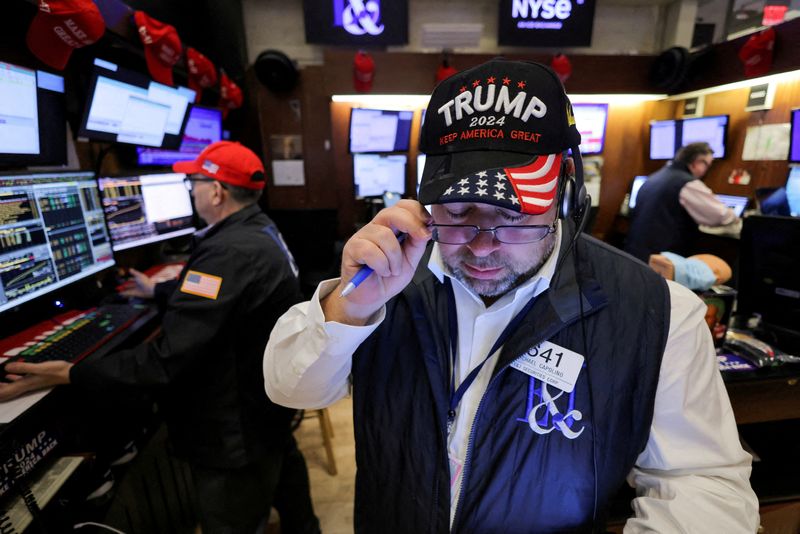By Tom Westbrook and Ankur Banerjee
SINGAPORE (Reuters) – Investors dusted off their trade war playbooks on Tuesday, confident their portfolios were better-prepared for Donald Trump this time after the U.S. President-elect took to social media and pledged new tariffs on Mexico, Canada and China.
Muscle memory, formed over years of gyrating to Trump’s tweets and threats in his first term, sent the dollar surging and the peso, loonie and yuan sinking within moments of his posts on the Truth Social app about tariffs he would implement from day one of his presidency.
Yet, as traders drew breath, they saw little in Trump’s announcements to shift expectations about either his policies or his bluster, including a negotiating style that investors feel better-placed to navigate than they were eight years ago.
“The 25% tariff headlines … are not policies as yet but a good indication that under a Trump presidency they will no longer tolerate the relocation of export manufacturing from China to the U.S. NAFTA partners by Chinese companies,” said George Boubouras, head of research at K2 Asset Management.
Trump, who takes office on Jan. 20, said he would immediately impose 25% tariffs on imports from Canada and Mexico until they clamped down on drugs and migrants crossing the border. He pledged an additional 10% tariff on Chinese goods, which he also linked to drugs – particularly fentanyl.
The dollar jumped more than 2% on the Mexican peso and about 1.4% on the Canadian dollar, before settling around 1% higher on each.
The dollar hit a four-month high on China’s yuan although share indexes in Hong Kong and China were mostly steady, as investors took Trump’s linking of tariffs with drug traffic as reinforcing expectations he was opening a negotiation.[.HK]
“China already has a template to deal with tariffs in reference to Trump 1.0,” said Simon Yu, vice general manager at Panyao Asset Management in Shanghai.
“Regarding other clampdowns such as tech-related sanctions, China may accelerate the process of self-reliance and import substitution.”
China said it had told the U.S. of progress in anti-narcotics enforcement and that “no one will win a trade war or tariff war.”
TIME WARP
Mexico’s tariff hit seemed to catch markets most off guard and was behind selling in automakers and other manufacturers across Asia that have plants in the United States’ southern neighbour.
Trump’s proposal appears to violate the terms of the U.S.-Mexico-Canada Agreement on trade.
Shares in Honda, which sends 80% of its Mexico production to the U.S., fell more than 2% to a 4-1/2 month low, while other car and component makers’ stocks fell.

